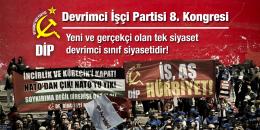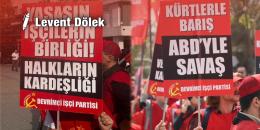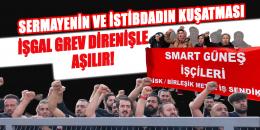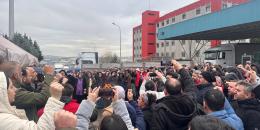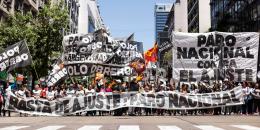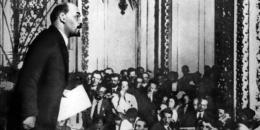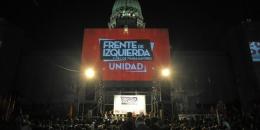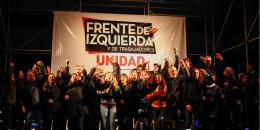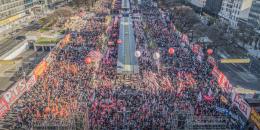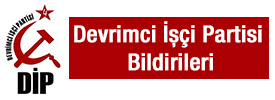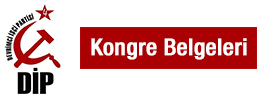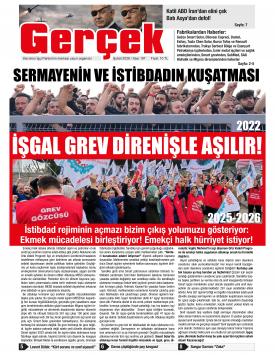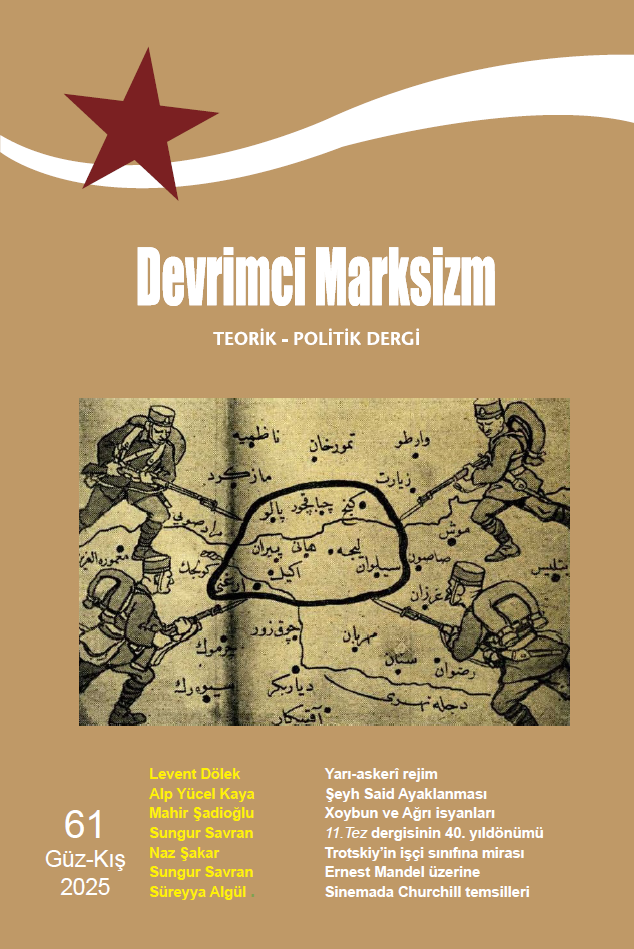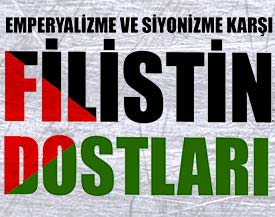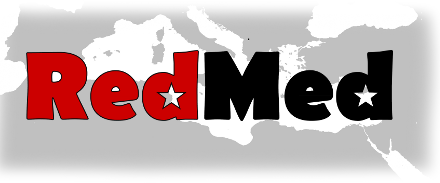Argentina: a gigantic power vacuum
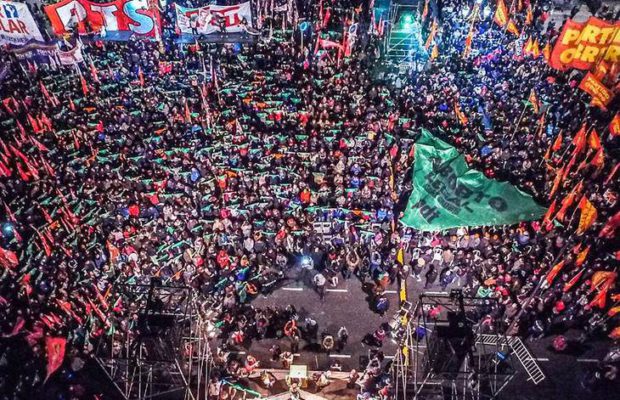
The primary elections (the PASO) of 11 August have created an almost unprecedented situation in Argentina. In a country that a profound economic crisis has been ravaging for more than a year now, the Macri government in power was searching for a second term with the purpose of continuing its collaboration with the IMF in order to lay the entire burden of the crisis on the shoulders of the working masses, thereby fulfilling its promises to international financial capital and the domestic bourgeoisie. Its main contestant was the Kirchnerist wing of the historic Peronist movement. Cristina Fernández Kirchner, twice president until Macri took over in 2015, was a scapegoat of the international bourgeoisie, supposedly because of her left-wing orientation. Calculating for the concrete circumstances of the day, this bourgeois politician handpicked a lackey of international financial capital, Alberto Fernández, a namesake but no relation, as her running mate. Her Frente de Todos (Front for All) thus became the main contender to the Cambiemos (Let Us Change) of Macri.
There were different opinions as to the chances of the Frente de Todos, but to our knowledge not a single soul could even have had an inkling of what we now have as the actual outcome. Although the PASO are primaries, they also indicate the rough support each party has for the coming elections in October. To everyone’s disbelief and astonishment, the so-called Fernández-Fernández ticket (or F-F) overwhelmed the Macri front by a margin of more than 15 percentage points (close to 47 % per cent as opposed to 31 %). Since the rule for the first round of the presidential elections in Argentina is 45 % plus one elected president (as opposed to a threshold of 50 % for a majority of other countries), had these been the official elections, the FF ticket, in other words Alberto Fernández, would have been in the presidential palace now.
The election results have thus played a nasty game on the Argentine bourgeoisie and beyond. The results have put the Argentine bourgeoisie in a quandary: Argentina now has two heads of government, one, Macri, without any popular mandate and the other, Fernández, without any official authority. The one who does not have a mandate is insisting to stay in power and the one who has a mandate from the people is avoiding it.
To put it another way, the meaning of the popular vote is loud and clear as can be: this PASO is the Greek referendum of July 2015 on another continent and in another guise. On that occasion the Greek people had refused the third round of austerity imposed by the Troika of the European Commission, the European Central Bank and the IMF. Now, the people of Argentina have said a resounding “No” (a powerful “Oxi”, to carry on the reference to the Greek referendum) to the IMF and the austerity policies of Macri in collaboration with it. But the institutional setup is such that this defeated president, a true believer in globalism and the neoliberal strategy of attacking the working class, has the legal right to stay in power until 10th December, i.e. a full four-month period from the date of the PASO! If the word democracy has any meaning, this president should go because he no longer has the popular mandate to pursue his IMF-style policies. But he is hanging on to power and saying he will fight to the end. One suspects that is the “end” for the Argentine economy as immediately after the PASO, capital flight has been accompanied by a headlong fall of the peso and other morbid symptoms.
On the other side of the equation is Alberto Fernández and the éminence grise of the Frente de Todos, Cristina Fernández. They have the moral support and the popular mandate to run the country, but are avoiding power like the plague. Alberto Fernández is pressured by the Argentine bourgeoisie to say out loud that he will manage Argentine’s economy “rationally”, i.e. in conformity with capitalist rationality, or at least to disclose his prospective “economic team”, meaning, of course, that he is expected to turn in a list of lackeys of “financial markets”, or, in other words, of the imperialist bourgeoisie. However, that will obviously become a disadvantage for Fernández, lest he lose some of his popular support to the forces to his left (more of that in a moment) and also he wants Macri to clean up the mess resulting from the total repudiation by the masses of the Macri term before the latter goes, so that he, Fernández can start a much easier job than cleaning the wreck first.
Thus power in Argentina has become a fireball for the main contending bourgeois forces. There is a power vacuum because no one recognises any credibility any longer to Macri and because Fernández himself is dead scared to hold the levers of power, even if partially. This is a national crisis in Lenin’s usage of the term.
The Argentine left
This unique situation has arisen not in any country. Had this been a country with no working class fighting tradition, lacking a socialist movement of significant proportions or one that is congenitally subordinated to the capitalist order, the bourgeoisie, both international and domestic, may not have worried excessively. Argentina is, however, a country with a history of convulsive class struggles, even by Latin American standards. The last memorable event was the Argentinazo of 2001-2002, during which a popular rebellion in the face of a severe economic crisis brought down four presidents within a matter of weeks, before the fifth one was able to cling to power until early elections. It is a spectre of this sort that haunts the Argentine domestic bourgeoisie, as well as the nightmare of a financial default.
Argentina is also one of the few countries in today’s world, if not the only one, in which it is the revolutionary left (together with centrist groupings) that dominates the left scene rather than the social democratic or post-Leninist (or “broad party”) currents. The Frente de Izquierda y de los Tarabajadores (FIT-Front of the Left and Workers) has been an important actor of the electoral (and only minimally) class struggle picture since 2011. Originally composed of three parties, this year it extended its horizon to still other parties and formed a broader front dubbed FIT-Unidad (FIT-Unity). Almost all the forces that have participated in the FIT-Unidad are of Trotskyist origin and subscribe to an at least nominally revolutionary reorganisation of state and society. The most important among these, in our opinion, is our sister party, the Partido Obrero, with its clear programmatic vision of the world of the 21st century and the place of Latin America and Argentina in particular in that world and its strong and combative organisation and its insertion within the workers’ movemement. It is true that at this moment the Partido Obrero is rocked by a factional fight between the majority and a minority. However, we are convinced that this rift may be overcome, if appropriately handled not only by the contending sides in Argentina but also by our international current, which bases itself on the 2004 programme of the Coordination for the Refoundation of the Fourth International.
Although not a force that can contend for power, the FIT nonetheless receives a sizeable number of votes and has sent a number of deputies to both the federal and state legislatures. It received some 700 thousand votes at the PASO of 11 July (more than 3 per cent of the popular vote). Since the different parties that have their place on this front have real ties in the organised working class movement, the so-called piquetero movement of the unemployed and the urban poor, the women’s movement that has recently fought valiantly against femicide and for legal and free abortion, the well-organised student movement etc. the Frente has significant mobilising capacity that reaches beyond its limited electoral clout, which means that should there occur a new Argentinazo, things will be made much more difficult for the bourgeois state.
Given the powerful traditions of the Argentine working class and the limited but significant forces of the revolutionary left, the power vacuum born in Argentina may, at a certain point and under certain circumstances, even become a serious menace for bourgeois power. We cannot go here into a critique of the different positions taken by the component forces of the FIT-Unidad vis-à-vis the power vacuum. We will instead put forth our own view regarding the tactical line that would raise the possibilities of the working class and the revolutionary left in the coming months and years.
Macri, take your IMF and go!
We start from the obvious: government power in Argentina is, at present, a fireball for all bourgeois parties in Argentina. The only politican worthy of mention who does want to hold to it is Macri, for without power he will lose his last, albeit very slight, chances of political rebirth. But he has no longer a popular mandate, as he is a political figure hideously defeated at the polls. Because he is the only one that clings to power, from the point of view of the revolutionary left, he should be forced to leave as soon as possible. This will make the power vacuum all the more absolute. With him it is a severely wounded leader that is holding the levers of government, a state akin to a power vacuum, but not exactly. With him gone, it will be an absolute vacuum.
Let it be said at an early stage that the demand that we propose, “Macri, take your IMF and go!” should indispensibly be accompanied by slogans that define a workers’ way out of the crisis, such as “Nationalise the banks and create a single state bank, with special attention to the small saver”, “State control of foreign trade”, “Suspend the convertibility of the peso” and “Full repudiation of the odious foreign debt”. Needless even to say, a series of demands regarding the concrete daily needs of the masses regarding jobs, wages, state expenditure in social services of all kinds etc. are the abc of revolutionary socialist policy in the face of such a deep crisis. All this will delineate, in the eyes of the masses, the political line of the socialists from the Kirchnerists (the F-F ticket). All of this should of course be topped with a constant drive to direct mass action, given the severity of the crisis and the threat to the life conditions of the masses.
No struggle without such economic demands. So much is true. However, sections of the Argentine revolutionary left seem to believe that the struggle over economic demands is a necessary precondition to the development of a political consciousness in the masses. We stress the word necessary, for even though it is true that the masses learn through fighting and fighting usually begins with a struggle for the masses’ immediate material needs, this is not the inescapable course of things and, under certain circumstances, politics can move independently to the fore in the dialectical scheme of things. This is precisely the situation in Argentina today. The power vacuum has changed the more usual order of things. Politics and economics have moved in an uneven manner because of this situation. Hence, the Argentine revolutionary left has to move forward by taking into consideration the concrete circumstances created by this power vacuum. The revolutionary forces of the proletariat cannot advance as if it were business as usual in a situation of national crisis.
The fight to bring Macri down would resonate immensely with the masses. The man is, at the moment, the culprit par excellence in their eyes regarding their suffering and impoverishment. Not only would “Macri, take your IMF and go!” not play into the hands of the Frente de Todos, it would, on the contrary make the heads of voters for the Kirchnerista ticket turn towards the FIT-Unidad. The irony is dazzling. The F-F do not wish to bring Macri down although they will in theory be the main benefactors of his fall! This will be noted with some grudge by at least a major section of their voters, especially if the revolutionary movement is skilfull enough in reaching out to them. And if as a result of this struggle Macri is effectively brought down, this will definitely seem to the masses, including the F-F voters, a great victory and increase exponentially interest in and sympathy for the FIT-Unidad parties.
The struggle against Macri is also a struggle against Fernández
Of course, being a ruling class experienced in crisis management (and by this we do not mean economic crisis management alone), the Argentine bourgeoisie and its international mentors will always try to find a substitute government until December. It could be a government of technicians of the kind the European bourgeoisie gave a try to in the first half of this decade in Greece and Italy. But that type of government would be even weaker than Macri, who after all has led the country for four years. An interim government in the midst of an electoral process is a very unusual situation that would create an atmosphere of extraordinary political crisis given also the context of profound economic crisis.
The push to have Macri resign would also serve to discredit Fernández to the highest extent possible in the eyes of the masses who suffer from the IMF-induced austerity policy orientation. Because whoever replaces Macri will not be able to boost the confidence of international financial capital on its own, Fernández will be drawn more and more into the management of the crisis, acting as the confidence man of international capital. There is a kind of impasse here for the Argentine bourgeoisie: either Fernández gets involved more and more with the day-to-day work of crisis management, which would erode his popularity in the eyes of the masses depending on the smaller or greater extent to which he gets involved, or he keeps aloof from the levers of crisis management, which will deepen the crisis.
So, in effect, the nature of the political situation, i.e. the character of the power vacuum, is such that saying “Go!” to Macri will not help Fernández, but will in effect weaken him. Add to this the following consideration: If Macri can be made to resign immediately or in the near future, one front of the bourgeoisie will have collapsed totally. We do not know what the institutional setup in Argentine electoral law would stipulate in case a candidate elected in the PASO goes, but it looks certain that this would amount to throwing the towel for Cambiemos. This would leave the F-F ticket seemingly alone in the electoral arena. However, now a FIT-Unidad respected for and strengthened by its fight against Macri would be in a better position to fight against F-F. More importantly, elections will become less and less the decisive arena for politics as the revolutionary socialist forces find a larger audience with the working class, through direct mass action but also through this kind of tactics regarding the national crisis.
Finally, all this should be accompanied by propaganda work regarding the dual power organs of the working class. We are speaking here of soviet-type organs. However, the soviet is the highest form of dual power organ for the class. The Argentine situation is not yet ripe, far from it, for a call to form soviets. But different kinds of rank and file organisations can and should be promoted at this early stage, such as factory committees, strike committees, neighbourhood livelihood committees or cost of life committees to take care of questions of fighting poverty etc. This should be accompanied by a careful preparation for the idea of soviets. The organisation of soviets (under names proper to the country in question naturally) can become a matter for agitational work only when the masses have risen in a revolutionary crisis. However, the propaganda work for soviets can and should start in situations where the objective conditions are maturing for a head-on clash between the classes.
The world situation creates immense pressures for the eruption of revolutionary activity in the workers and poorer strata of society all over the world, from Haiti to Iran and from Zimbabwe to the France of the Yellow Vests, with Sudan and Algeria leading the way in their revolutionary heroism and perseverance. Argentina is going through tumultous days, weeks and months under the strain of one of the direst economic crises on the planet. Surely politics does not follow economics obediently and there have been many instances in history of economic crises leading even to dispersion, demoralisation and defeat for the masses. The Argentine masses did not seem, since the extraordinary days of resistance in December 2017, prepared to fight back actively and massively. This diminished to a certain extent the possibilities of revolutionary action. Now, however, through one of those ironic twists of history, an electoral glitch has created a power vacuum and consequently a national crisis. The revolutionary left can, by seizing on this opportunity, challenge the rule of the bourgeoisie through more revolutionary methods, combining economic demands and political tactics. The four months ahead will be a convulsive period. The proletarian forces of Argentina should not remain aloof to these opportunities.

